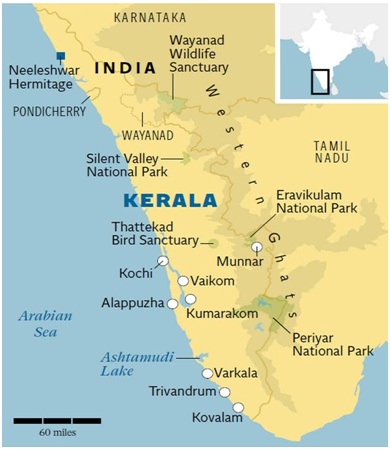Wayanad Wildlife Sanctuary
With the onset of summer, the seasonal migration of wild animals has begun from the adjacent wildlife sanctuaries in Karnataka and Tamil Nadu to the Wayanad Wildlife Sanctuary (WWS).
Context
With the onset of summer, the seasonal migration of wild animals has begun from the adjacent wildlife sanctuaries in Karnataka and Tamil Nadu to the Wayanad Wildlife Sanctuary (WWS).
About Wayanad Wildlife Sanctuary
- This wildlife sanctuary is located in Wayanad, Kerala.
- Wayanad Wildlife Sanctuary (WWS) is an integral part of the Nilgiri Biosphere Reserve.
- Nilgiri Biosphere Reserve was the first from India to be included in the UNESCO designated World Network of Biosphere Reserves (designated in 2012).
- Established in: 1973
- It is the second largest wildlife sanctuary in Kerala.
-
This wildlife sanctuary Spread over 344.44 sq km, is contiguous to the tiger reserves and is bounded by the protected area network of Nagarhole National Park and Bandipur National Park in Karnataka in the northeast, and on the southeast by Mudumalai National Park in Tamil Nadu.
-
Kabini river (a tributary of the Cauvery river) flows through the sanctuary.
- It is part of the Deccan Plateau and Western Ghats.
- The forest types include South Indian Moist Deciduous forests, West coast semi-evergreen forests and plantations of teak, eucalyptus and Grewelia.
- It comes under Protect Elephant.
- Elephant, Gaur, Tiger, Panther, Sambar, Spotted deer, Wild boar, Sloth bear, Nilgiri langur, Bonnet macaque, Common langur, Malabar giant squirrel etc are the major mammals.
- This protection area is inhabited by Paniyas, Kurubas, Adiyans, Kurichiyas, Ooralis and Kattunaikkans scheduled tribes.


